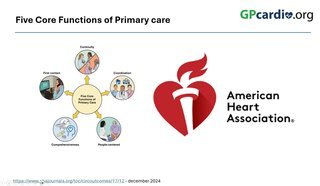







A recent study in the Netherlands explored trends from 2013 to 2019 in achieving target levels for biological (e.g., blood pressure, cholesterol) and lifestyle (e.g., smoking, exercise) risk factors among patients enrolled in CVRM care

A systematic review of clinical practice guidelines (CPGs) for the primary prevention of atherosclerotic cardiovascular disease (ASCVD) was conducted to assess the most effective strategies for reducing ASCVD risk.

A recent population-based study in Spain examined the relationship between patients' profiles, defined by their sociodemographic and clinical characteristics, and the frequency of visits to primary care (PC) physicians and nurses.

The American Heart Association (AHA) recently issued Life’s Esseential 8, stating that Primary care plays a crucial role in delivering whole-person, integrated, and equitable health care that meets most health needs. It is uniquely positioned to identify and address behaviors that conflict with Life's Essential 8 (LE8) and to support populations facing cardiovascular health disparities.

In a population-based study, researchers found that both the relative genetic risk, assessed through a polygenic risk score and the absolute clinical risk, evaluated by SCORE2, independently contribute to an individual's overall CVD risk.

Prof Jakovljevic provides a brief overview of the STRATIFYHF study, an AI-based decision support system that could change the ways which heart failure is diagnosed and being managed

Prof. Seferovic highlights the importance of the STRATIFYHF study aiming to support early diagnosis of heart failure in Primary and Secondary care, by using an AI-based decision support system

At ACC.24, Dr. Alexander Blood shared insights from the DRIVE study, which examined the effectiveness of a remote program integrating patient education and medication management in increasing prescriptions for SGLT2 inhibitors and GLP-1RAs among type 2 diabetes (T2D) patients at elevated cardiovascular (CV) and/or renal risk

In a recent study presented at ACC.24, it was found that over 90% of patients correctly identified their suitability for nonprescription access to low-dose rosuvastatin using an innovative web application. This treatment proved to be safe overall and resulted in a significant 36% reduction in LDL cholesterol levels.

At ACC.24, Dr. Alexander Fanaroff presented findings from the BE ACTIVE trial, demonstrating how gamification and financial incentives effectively boosted physical activity among patients at risk for cardiovascular events over a 12-month intervention period.

STRATIFY-HF will develop, validate and implement the first AI-based, decision support system (DSS) for risk stratification, early diagnosis, and disease progression assessment in HF to accommodate both primary and secondary care clinical needs.

Primary care practitioners should note a significant global shift from underweight to obesity dominance over the past three decades, as revealed by an analysis of 3663 population-based studies.